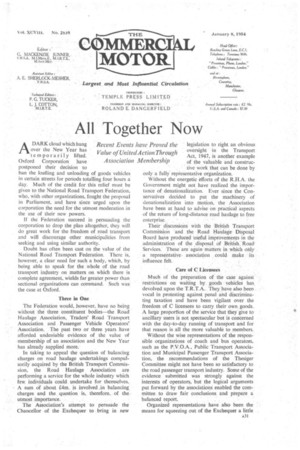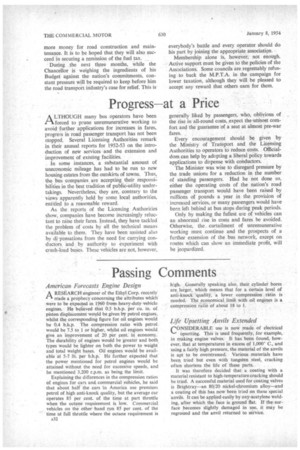All Together Now
Page 33

Page 34

If you've noticed an error in this article please click here to report it so we can fix it.
ADARK cloud which hung over the New Year has temporarily lifted. Oxford Corporation have postponed their decision to ban the loatling and unloading of goods vehicles in certain streets for periods totalling four hours a day. Much of the credit for this relief must be given to the National Road Transport Federation, who, with other organizations, fought the proposal in Parliament, and have since urged upon the corporation the need for the utmost moderation in the use of their new powers.
If the Federation succeed in persuading the corporation to drop the plan altogether, they will do great work for the freedom of road transport and will discourage other municipalities from seeking and using similar authority.
Doubt has often been cast on the value of the National Road Transport Federation. There is, however, a clear need for such a body, which, by being able to speak for the whole of, the road transport industry on matters on which there is complete agreement, wields far greater, power than sectional organizations can command. Such was the case at Oxford.
Three in One The Federation would, however, have no being without the three constituent bodies—the Road Haulage Association, Traders' Road Transport Association and Passenger Vehicle Operators' Association. The past two or three years have afforded undeniable evidence of the value of membership of an association and the New Year has already supplied more.
In taking to appeal the question of balancing charges on road haulage undertakings compulsorily acquired by the British Transport Commission, the Road Haulage Association are performing a service for the whole industry which few, individuals could undertake for themselves.. A sum. of about £4m. is involved in balancing charges and the question is, therefore, of the utmost importance.
The Association's attempt to persuade the Chancellor of the Exchequer to bring in new oversight in the Transport Act, 1947, is another example of the valuable and construe tive work that can be done by only a fully' representative organization.
Without the energetic efforts of the R.H.A. the Government might not have realized the importance of denationalization. Ever since the Conservatives decided to put the machinery of denationalization into motion, the Association have been at hand to advise on practical aspects of the return of long-distance road haulage to free enterprise..
Their discussions with the British Transport Commission and the Road Haulage Disposal Board have produced useful improvements in the administration of the disposal Of British Roach Services. These are againmatters in which only a representativeassociation could make its influence felt.
Care of C Licensees Much of the preparation of the case against restrictions on waiting by goods vehicles has devolved upon the T.R.T.A.. They have also been vocal in protesting against penal and discriminating taxation and have been vigilant over the freedom of C licensees to carry their own goods. A large proportion of the service that they give to ancillary users is not spectacular but is concerned with the day-to-day running of transport and for that reason is all the more valuable to members.
Without the wise representations of the responsible organizations of coach and bus operators, such as the P.V.O.A., Public Transport Association and Municipal Passenger Transport Association, the recommendations of the Thesiger Committee might not have been so satisfactory to the road passenger transport industry. Some of the evidence submitted was strongly against the interests of operators, but the logical arguments put forward by the associations enabled the committee to draw fair conclusions and .prepare a balanced report.
Organized representations have aiSo been the means for squeezing out of the Exchequer a little more money for road construction and maintenance. It is to be hoped that they will also succeed in securing a remission of the fuel tax.
During the next three months, while the Chancellor is weighing the ingredients of his Budget against the nation's commitments, constant pressure will be required to keep before him the road transport industry's case for relief. This is everybody's battle and every operator should do his part by joining the appropriate association.
Membership alone is, however, not enough. Active support must be given to the policies of the Associations. Some councils are regrettably refusing to back the M.P.T.A. in the campaign for lower taxation, although they will be pleased to accept any reward that others earn for them.




































































































